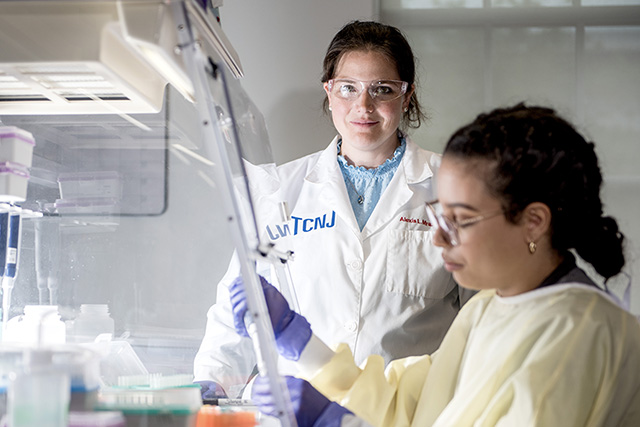There are few things more important to our daily lives than clean water. The challenges of climate change, pollution, and contamination of water supplies are threatening safe drinking water around the globe.
TCNJ School of Nursing and Health Sciences faculty member Alexis Mraz and her colleague Jade Mitchell, a Michigan State University professor and environmental engineer, were awarded a $2.1 million grant from the United States Environmental Protection Agency to better understand and determine the type and levels of opportunistic pathogens in our water supplies and what the associated risks of those pathogens are for the end users.

“We’re quantifying the microbes in the water you are drinking to gauge what’s actually there,” Mraz said. “Then we are using that quantification to develop a risk assessment and help determine what levels are going to make people sick.”
Water utility companies typically treat water with chemicals and disinfectants, including chlorine, to kill bacteria before the water reaches the end user. But there are limits as to what levels of those products are safe.
“The problem is determining how to keep steady and safe levels of chlorine throughout these huge distribution systems,” Mraz said. “We need a certain level to ward off microbial intrusion, but if the levels of those chemicals are too high, that can also make people sick.”
Urban areas, particularly those with older water distribution systems, are especially at risk.
“Older pipes typically allow for greater intrusion levels from the ground, which increases likelihood of having opportunistic pathogens,” Mraz said.
This EPA grant will help water management facilities to better understand how to manage these levels and improve their practices to ensure safer water throughout the United States, all of which drew graduate student Kayla Shorter to the project. Shorter will be working with Mraz on a project specific to Legionella, a bacteria that can cause serious lung disease.
“It is extremely gratifying to know that what we’re doing in the lab here at TCNJ can impact the ways we think about water system safety,” Shorter said. “Water quality is so vital to the health and safety of our communities. I have always been drawn to the environmental aspect of public health, so I am extremely grateful that this work can make such an impact.”
Shorter also knows through previous work with Mraz that the hands-on experience she gains in the lab will benefit her in her professional pursuits.
“This opportunity has shaped my current career path as many of the jobs I am looking for are research associate positions,” she said. “Dr. Mraz showed me a part of public health that I hadn’t gotten a chance to experience. I have learned a lot about laboratory protocols and scientific writing, and I also got to build upon my data analysis skills.”
